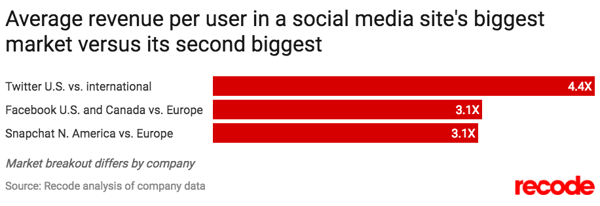“Unriddled” is HubSpot’s weekly digest of the tech headlines you need to know. We give you the top tech stories in a quick, scannable way and break it all down. It’s tech news: explained.
Unriddled: The Tech News You Need
1. Amazon Is Rumored to Split Its Second HQ Between Two Cities
Several months after announcing its “narrowed” list of 20 contenders for its HQ2 location, rumors are swirling that Amazon will actually split its second headquarters between two cities.
The two likely winners are Crystal City, Virginia (a neighborhood within the Washington D.C. suburb of Arlington) and Long Island City, a neighborhood within the Queens borough of New York.
According to The New York Times, about 50,000 employees will be split between these two cities, should they be the final cities selected — and where “Amazon already has more employees … than anywhere else outside of Seattle, its home base, and the Bay Area.” Read full story >>
2. Facebook, Twitter and Snapchat Aren’t Adding New U.S. Users
According to a new report from Recode, three of the largest-known social networks — Facebook, Twitter, and Snapchat — have stopped growing in the U.S.
That’s bad news for all three networks, for whom U.S.-based users generate over 3X as much revenue for social media companies than those in Europe — and over 10X as much for those in Asia-Pacific region (where Facebook, for instance, is growing fastest).

Source: Recode
“The one exception,” to this all-but-halted U.S. growth, the study says, “appears to be Instagram,” where monthly active user numbers continue to increase. Read full story >>
3. Google’s Latest Chrome Browser Will Crack Down Even More on Abusive Ads
After discovering that its most recent round of protections against abusive ads weren’t as effective as hoped, Google says the newest edition of its browser — Chrome 71 — will more strictly penalize sites with repeated instances of showing these ads.
The ads in question in this particular move are those that pose as system warnings — or those with misleading visuals like “close” buttons that do not actually close the ad, but rather redirect the user to another (usually harmful) site.
.gif?t=1541636985267&width=320&name=0%20(1).gif)
Source: Google
“The one exception,” to this all-but-halted U.S. growth, the study says, “appears to be Instagram,” where monthly active user numbers continue to increase. Read full story >>
Sites that are reported to have these ads will be given 30 days to remove them. Meanwhile, beginning in December, Google says the Chrome 71 browser will remove all ads appearing on sites that are already known to have repeated instances of abusive ad displays. Read full story >>
4. Hackers Claim to Have Personal Facebook Accounts Details for Sale, Including Private Messages
A report from the BBC says that unknown hackers have obtained personal details for the accounts of 120 million Facebook users — and appear to have published private messages for around 81,000 of them.
The attackers, who shared these details with BBC Russian Service, claim to be trying to sell these account details, which Facebook says were not obtained as a result of compromised site security.
Rather, the company says, corrupt browser extensions are to blame — and while these extensions were described as “malicious,” few details have been released as to how they were used to scrape this account data.
“We have contacted browser-makers to ensure that known malicious extensions are no longer available to download in their stores,” Facebook VP of Product Management Guy Rosen told the BBC. “We have also contacted law enforcement and have worked with local authorities to remove the website that displayed information from Facebook accounts.” Read full story >>
5. Is Amazon Really Gaining on Google’s Search Traffic? [New Data]
Some speculate that Amazon is gaining on Google’s search traffic, while others say it’s shrinking. We had a look at some data to figure what people are using to search for different types of information. Read full story >>
6. Here’s What’s Stopping Virtual Reality From Going Mainstream
While some in the technology have lofty dreams of virtual reality (VR) going mainstream, it might be a while before we get there. Here’s what we learned about the public perception of VR. Read full story >>











